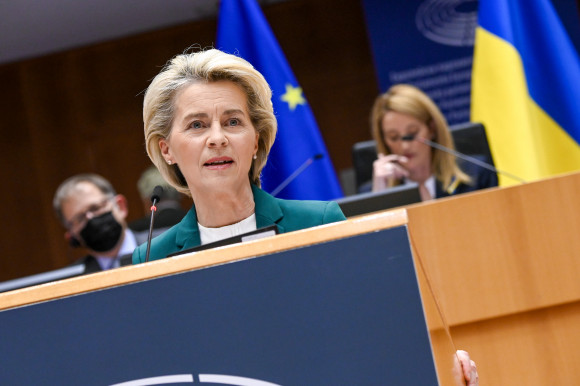
04/03/2022
EU Insight, 4 March 2022
Brussels, 4 March 2022
EU AND ALLIES RESPOND WITH SEVER SANCTIONS TO RUSSIA’S AGRESSION ON UKRAINE
Since the invasion of Ukraine in the morning of 24 February, the EU and its allies have responded with unprecedented incremental series of sanctions against Russia. The restrictive measures imposed so far include asset freezes (targeting, among others, President Putin and Foreign Minister Lavrov) and travel bans, a ban on the overflight of EU airspace, a ban of the transactions with the Russian Central Bank, the prohibition for state-owned media Russia Today and Sputnik to broadcast in the EU and the exclusion of seven Russian banks from SWIFT, among others. Further sanctions could be adopted in the coming days, depending on how the situation evolves.
COMMISSION OFFERS HUMANITARIAN AID FOR WAR-AFFECTED UKRANIAN CIVILIANS
As the humanitarian situation in Ukraine worsens and civilians flee in massive numbers to bordering countries, the Commission announced to mobilise an additional €90 million for humanitarian aid programmes to offer support to war-affected civilians in Ukraine and Moldova. The Commission is also coordinating the delivery of material assistance via the EU Civil Protection Mechanism to Ukraine, which includes essential medical care items and civil protection support. At the same time, the Commission proposed to grant temporary protection for people fleeing the war through the activation of the Temporary Protection Directive, and provided guidelines to ensure efficient and safe border management for Member States.
COMMISSION TAKES STOCK OF THE IMPLEMENTATION OF THE RRF
The European Commission published its first annual report on the implementation of the Recovery and Resilience Facility (RRF). The report shows that major progress has been achieved and that all Member States are benefitting from a cross-border spillover effect. So far, the funding provided by the Commission, under 22 recovery plans, amounts to EUR 445 billion. More than 40% of the plans’ total allocation is related to measures that support climate objectives and 26% to digital expenditure – in both cases exceeding the set-out targets. Four plans have have yet to be adopted while the Netherlands is the only country that still has not submitted its plan.
PLATFORM ON SUSTAINABLE FINANCE ISSUES ITS FINAL REPORT ON A SOCIAL TAXONOMY
The Platform on Sustainable Finance presented its final report on the proposal for a social taxonomy. The document proposes a preliminary recommendation for such a framework and recommends a set of objectives. These objectives are based on international standards and guidelines on human rights valid in the EU. They centre around the types of stakeholders affecting different economic activities capable of making a positive contribution, i.e. the workforce, including value-chain workers, end-users/consumer and affected communities, directly or through the value-chain. The Commission’s report on whether and how social objectives could be integrated into the taxonomy framework is currently expected in end-2022.
COMMISSION LOOKS AT FURTHER SHAPING PROPOSED EU DIGITAL IDENTITY FRAMEWORK
The Commission launched an online platform to gather feedback from stakeholders on the shape of potential European digital identity (eID) wallets. The plan was originally laid out in the proposal for a European digital identity framework in July 2021, which introduced the concept of “wallets” as a way for citizens to store, manage and exchange identity data electronically. In addition to the virtual community platform, the Commission will also implement four large-scale projects to test the eID wallets’ deployment in EU Member States. Lastly, Member States were also asked to work on a toolbox for technical aspects of the eID framework, which is expected to be finalised by September 2022.
COMING UP NEXT WEEK
- 6-7 March: Foreign Affairs Council. On the agenda: challenges of cooperation in a context of heightened competition in the priority regions of the EU and post-COVID-19 recovery.
- 7-8 March: Informal Meeting of Ministers for Culture. On the agenda: the European cultural sovereignty in the digital age and Europe’s commitment to cultural and linguistic diversity.
- 7-10 March: European Parliament Plenary session. On the agenda: Ukraine war, energy Communication.
- 8 March: College of Commissioners. On the agenda: Joint European Action for more affordable, secure and sustainable energy.
- 8-9 March: Informal Meeting of Ministers in charge of Telecommunications. On the agenda: outlook for digital policy in Europe.
- 10-11 March: Informal meeting of heads of state or government. On the agenda: EU coordinated response to the Russia-Ukraine conflict.
Karl Isaksson, Managing Partner Brussels, Kreab
____________________________________________________________________
Kreab • Tel: +32 2 737 6900 • karl.isaksson@kreab.com • www.kreab.com/brussels • Twitter: @KreabEU.
